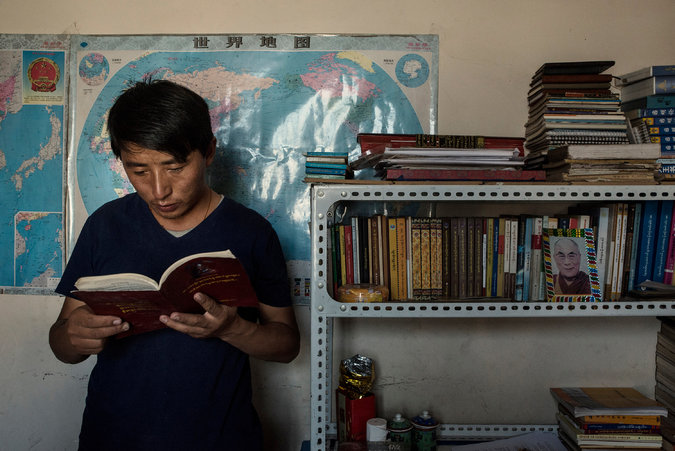Tibetan entrepreneur and language education advocate Tashi Wangchuk was detained in January 2016 shortly after appearing in a New York Times documentary story about his fight to preserve the Tibetan language. In March 2016 he was charged with “inciting separatism,” and today he stood trial in Yushu Tibetan Autonomous Prefecture, Qinghai. At The Guardian, Benjamin Haas reports:
Tashi Wangchuk pleaded not guilty to the charges of “inciting separatism” during the four-hour trial in the western Chinese city of Yushu, where the state’s main piece of evidence against him was the nine-minute video, according to his lawyer, Liang Xiaojun.
[…] He faces up to 15 years in prison if convicted, and the judge said he would deliver a verdict at a later date. China’s Communist party-controlled courts have a conviction rate of more than 99%.
Tashi had advocated for greater use of Tibetan in education, bemoaning the use of Mandarin for most instruction in classrooms where the majority of students are Tibetan. Many Tibetans view language policies as an attempt by the government to destroy their culture.
In the New York Times video, he travels to Beijing and tries to file a lawsuit against officials in Yushu, but is ultimately turned away. “I want to try to use the People’s Republic of China’s laws to solve the problem,” he said in the video. […] [Source]
At The New York Times, Chris Buckley relays more details on Tashi Wangchuk’s trial and not guilty plea:
His lawyers said that Mr. Tashi, speaking in Chinese, used the hearing to reject the idea that his efforts to revive Tibetan language and culture were a crime. Mr. Tashi has insisted that he does not advocate independence for Tibet, but wants the autonomy and rights for ethnic minorities that are promised by Chinese law.
“Tashi argued that his idea was to use litigation to force local governments to stop ignoring Tibetan language education, and he was exercising his right as a citizen to criticize,” Liang Xiaojun, one of Mr. Tashi’s two defense attorneys, said outside the courthouse after the trial.
“He said that he wasn’t trying to split the country,” Mr. Liang added, “but exercising his rights as a citizen of the People’s Republic of China, which includes Tibetan citizens.”
Court officials refused to allow a Times reporter into the trial, despite several requests. The trail received international attention, with diplomats from the United States, Germany, Britain, Canada and the European Union also showing up in unsuccessful efforts to attend the hearing. [Source]
On Twitter, Buckley shared images from outside of the courtroom and around Yushu:
In Yushu, Qinghai, relatives of Tashi Wangchuk, the Tibetan businessman on trial after speaking to the Times about protecting the Tibetan language, gather outside the courthouse. pic.twitter.com/j6s4PL52Li
— Chris Buckley 儲百亮 (@ChuBailiang) January 4, 2018
Residents waiting outside the courthouse in Yushu, Qinghai. pic.twitter.com/qVeAs2ta5Q
— Chris Buckley 儲百亮 (@ChuBailiang) January 4, 2018
Tashi Wangchuk’s relatives gather outside the court in Yushu after his trial ended without a verdict. Story coming. pic.twitter.com/jd4XomNKbR
— Chris Buckley 儲百亮 (@ChuBailiang) January 4, 2018
Life goes on in Yushu. pic.twitter.com/uqLdxXBjb7
— Chris Buckley 儲百亮 (@ChuBailiang) January 4, 2018
In a press release, Amnesty International condemned the trial as a “sham” and the charges against Tashi Wangchuk as “absurd”:
The trial today of a Tibetan language education activist, who could face up to 15 years in jail for “inciting separatism”, has exposed how ludicrously unjust the case against him is, Amnesty International said.
[…]“It is appalling that Tashi Wangchuk could face up to 15 years’ imprisonment simply for expressing his views in media interviews. These are blatantly trumped up charges and he should be immediately and unconditionally released,” said Roseann Rife, Amnesty International’s East Asia Research Director.
“Exposing and criticizing the way Tibetan language and culture are being suppressed by government policies is a legitimate exercise of free speech. Labelling it as a form of “inciting separatism” demonstrates how the Chinese authorities blatantly misuse this criminal charge to silence dissent.” [Source]
The AP’s Gerry Shih relays critique from Human Rights Watch’s Sophie Richardson, and notes similar harsh government pressure on other ethnic rights advocates in China:
“All Tashi Wangchuk has done is peacefully advocate for constitutionally guaranteed rights,” said Human Rights Watch China director Sophie Richardson. “If Chinese authorities consider that ‘inciting separatism,’ it’s hard to tell what isn’t.”
China’s ruling Communist Party often equates advocacy for greater autonomy or rights for its ethnic minority Tibetans, Uighurs and Mongolians with outright separatism. And its courts often hand down particularly harsh punishment to those criticizing the government’s ethnic policies relative to other issues.
Rights groups around the world widely condemned China after it issued a life sentence in 2014 to Ilham Tohti, a moderate though outspoken Uighur critic of Beijing’s policies in Xinjiang, the region that is home to the Uighurs. He was convicted of fanning ethnic hatred, advocating violence and instigating terror through his classroom teaching and a website on Uighur issues. [Source]








